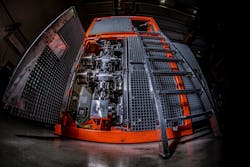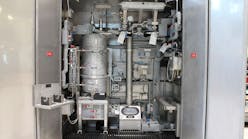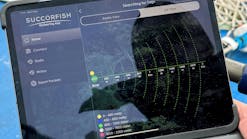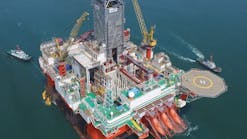Solids management, which affects over 70% of fields globally, impacts the entire lifecycle of a well. If an accumulation of solids is left untreated, this can lead to decreased production, reduced flow rates and the eventual shut-in of the well.
FourPhase has developed the DualFlow 5K PSI as the first automated solids management system, designed to separate solids in a way that helps cut emissions and improve operational safety. The system comprises a dual cyclone desander occupying a 2x2-m footprint, with a modular design that allows for a stackable and compact solution. It weighs less than 10 t and can be easily integrated onto a crowded rig floor. Together with 3D rig-ups prior to mobilizations, it assists planning during the front-end engineering phase.
With 560 sensors integrated into each DualFlow system, data is captured in real time. The data supports production management, identification of trends and continual improvements to uptime, also allowing operators to quantify the solids separated. In addition, the system eliminates discharge of oil-contaminated solids to sea. Conventionally, solids gathered at the surface must be removed and cleaned via a multi-stage process before they can be released to sea.
However, current methods do not eliminate oil from these solids completely: the current dispensations for total oil to be discharged to sea is roughly 7% in the North Sea, far greater in other areas. While dispensations exist, they don’t remove the environmental impact that the activity will have. DualFlow enables operators to remove and accurately log hydrocarbon-contaminated sand particles. Operators do not require the dispensations caused by unmanaged solids.
The system also removes the need for interventions in many situations, for instance. Coiled Tubing Clean Out (CTCO) operations, for example, have a significant CO2 footprint due to the transport logistics and energy consumption required. However, in cases where a CT operation is required, the DualFlow can be easily integrated into the process to remove any risk of solids entering the production facility, avoiding the possibility of a shutdown.
Solids cause erosion and potentially catastrophic failure in process equipment. The DualFlow can be installed at various points in the production process to prevent this. When installed downstream from the wellhead and upstream of the production separator, it protects the integrity of the subsequent equipment by removing the solids.
Manual handling-related activities are responsible for a large amount of workplace injuries in the oil and gas industry. The system’s automated capabilities can eliminate these risks entirely, and this approach also limits the need for hazardous manual labor tasks, such as emptying separators for solids.
FourPhase believes that this technology can bring about positive change in regulations through its track record in reducing environmental impact. For example, the separation and cleaning technology for jetting operations can eliminate discharge that would traditionally come from jetting operations. Where dispensations exist, the company is working with regulatory bodies to remove the need for any discharge to be permitted.
While solids occur throughout the lifetime of a well, it is widely accepted that problems increase as the well ages. Effective solids management can maintain the production plateau of the well for longer, extend the lifetime of a well and defer the process of decommissioning. The need for solids management will likely further increase as operators strive to optimize their field developments and production, and improve field economics.
The author
Steve Greenland is the Chief Commercial Officer of FourPhase. His background in industrial automation, with experience in platform commissioning, brownfield modifications and asset integrity management. Previously he held global roles at Roxar, Honeywell, and Baker Hughes.





